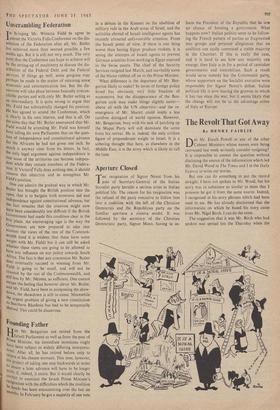p ounding Father H At) Mr. Bengurion not retired from the Pr ime
Israeli Parliament as well as from the post of :ill* Minister, his immediate intentions might have been subject...to widely differing interpreta- ti"s. After all, he has retired before only to return at his chosen moment. This time, however, the Project of taking one step backwards in order to insure a later advance will have to be longer to if, indeed, it exists. But it would clearly be correct to associate the Israeli Prime Minister's resignation with the difficulties which the coalition he heads has been encountering over the last six months. In February he got a majority of one vote
in a debate in the Knesset on the abolition of military rule in the Arab areas of Israel, and the activities abroad of Israeli intelligence agents has recently attracted unfavourable attention. From the Israeli point of view, if there is one thing worse than having Egypt produce rockets, it is seeing the attempts of Israeli agents to prevent German scientists from working in Egypt exposed in the Swiss courts. The chief of the Security Services resigned last March, and inevitably some of the blame rubbed off on to the Prime Minister.
What difference is the departure of Mr. Ben- gurion likely to make? In terms of foreign policy Israel has obviously very little freedom of manoeuvre, but the disappearance of the Ben- gurion style may make things slightly easier— above all with the UN observers—and the re- emergence of Mr. Sharett could imply a less carefree disregard of world opinion. However, Mr. Bengurion, busy with his task of patching up the Mapai Party will still dominate the scene from his retreat. He is, indeed, the only civilian figure of preponderant weight in Israel. it is a sobering thought that here, as elsewhere in the Middle East, it is the army which is likely to call the tune.


































 Previous page
Previous page